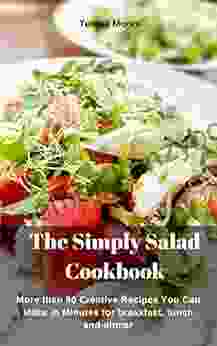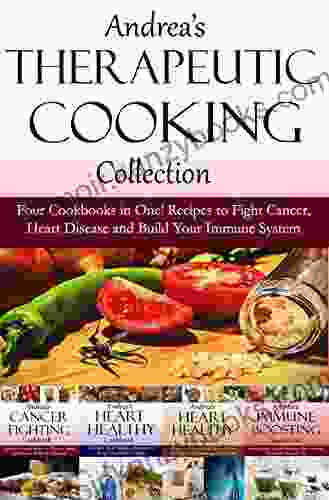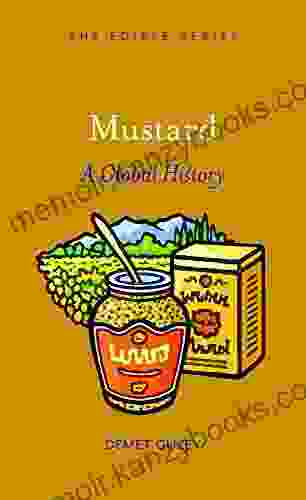Mustard: A Global History

4.7 out of 5
| Language | : | English |
| File size | : | 3109 KB |
| Text-to-Speech | : | Enabled |
| Screen Reader | : | Supported |
| Enhanced typesetting | : | Enabled |
| Print length | : | 147 pages |
Mustard is a condiment made from the seeds of the mustard plant, which is a member of the Brassicaceae family. The seeds are crushed and mixed with water, vinegar, or other liquids to form a paste. Mustard can be yellow, brown, or black, and it has a sharp, pungent flavor.
Mustard has been used for centuries as a condiment, spice, and medicine. It is thought to have originated in Asia, where it was used in traditional Chinese and Indian medicine. Mustard was introduced to Europe by the Romans, and it quickly became a popular condiment. In the Middle Ages, mustard was used as a preservative for meat and fish. It was also used as a condiment for soups, stews, and other dishes.
Mustard was brought to the Americas by European colonists, and it quickly became a popular condiment in the United States and Canada. In the 19th century, mustard was mass-produced for the first time, and it became even more popular. Today, mustard is one of the most popular condiments in the world. It is used in a wide variety of dishes, from sandwiches and burgers to salads and dips.
Mustard is a versatile condiment that can be used to add flavor to a variety of dishes. It is also a good source of nutrients, including iron, calcium, and magnesium.
The Mustard Plant
The mustard plant is a member of the Brassicaceae family, which also includes cabbage, broccoli, and cauliflower. Mustard plants are native to Asia, but they are now grown all over the world.
Mustard plants are annuals, which means that they complete their life cycle in one year. They grow to be about 2-3 feet tall and have large, deeply lobed leaves. The flowers are small and yellow, and they produce pods that contain the mustard seeds.
Mustard seeds are small, round, and black. They have a sharp, pungent flavor. Mustard seeds are used to make mustard, but they can also be used to make other products, such as mustard oil and mustard greens.
Mustard Production
Mustard is produced by crushing the mustard seeds and mixing them with water, vinegar, or other liquids. The mixture is then ground into a paste. The color of the mustard depends on the type of mustard seeds used. Yellow mustard is made with white mustard seeds, brown mustard is made with brown mustard seeds, and black mustard is made with black mustard seeds.
Mustard can be made at home or commercially. Commercial mustard is typically made with a blend of different types of mustard seeds. This gives the mustard a more complex flavor.
Types of Mustard
There are many different types of mustard, each with its own unique flavor. Some of the most popular types of mustard include:
* Yellow mustard: Yellow mustard is the most common type of mustard. It is made with white mustard seeds and has a mild, slightly sweet flavor. * Brown mustard: Brown mustard is made with brown mustard seeds and has a stronger, more pungent flavor than yellow mustard. * Black mustard: Black mustard is made with black mustard seeds and has the strongest, most pungent flavor of all the mustards. * Dijon mustard: Dijon mustard is a French mustard made with brown mustard seeds and white wine. It has a smooth, creamy texture and a slightly tangy flavor. * Honey mustard: Honey mustard is a sweet mustard made with yellow mustard seeds and honey. It has a sweet, tangy flavor. * Horseradish mustard: Horseradish mustard is a spicy mustard made with yellow mustard seeds and horseradish. It has a sharp, pungent flavor.
Mustard Uses
Mustard is a versatile condiment that can be used in a variety of dishes. It is commonly used on sandwiches, burgers, and hot dogs. Mustard can also be used as a dipping sauce for pretzels, chips, and other snacks.
Mustard is also a popular ingredient in many recipes. It can be used to add flavor to soups, stews, sauces, and marinades. Mustard can also be used to make salad dressings, dips, and spreads.
Mustard Nutrition
Mustard is a good source of several nutrients, including iron, calcium, and magnesium. It also contains antioxidants, which can help to protect the body from damage caused by free radicals.
One tablespoon of yellow mustard contains the following nutrients:
* Calories: 10 * Fat: 1 gram * Carbohydrate: 2 grams * Protein: 1 gram * Iron: 10% of the Daily Value (DV) * Calcium: 4% of the DV * Magnesium: 4% of the DV
Mustard Benefits
Mustard has several potential health benefits, including:
* Anti-inflammatory properties: Mustard contains compounds that have anti-inflammatory properties. These compounds may help to reduce inflammation in the body and protect against chronic diseases, such as heart disease and cancer. * Antioxidant properties: Mustard also contains antioxidants, which can help to protect the body from damage caused by free radicals. Free radicals are unstable molecules that can damage cells and DNA. * Digestive health: Mustard can help to improve digestive health. The enzymes in mustard can help to break down food and promote digestion. Mustard can also help to relieve gas and bloating. * Cardiovascular health: Mustard may help to improve cardiovascular health. The compounds in mustard can help to lower cholesterol and blood pressure.
Mustard Side Effects
Mustard is generally safe to consume, but it can cause side effects in some people. These side effects include:
* Skin irritation: Mustard can cause skin irritation in some people. This is because mustard contains compounds that can irritate the skin. * Allergic reactions: Some people may be allergic to mustard. Symptoms of a mustard allergy include hives, swelling, and difficulty breathing. * Asthma: Mustard can trigger asthma attacks in some people. This is because mustard contains compounds that can constrict the airways.
If you experience any side effects from eating mustard, you should stop eating it and talk to your doctor.
Mustard is a versatile condiment that can be used to add flavor to a variety of dishes. It is also a good source of several nutrients, including iron, calcium, and magnesium. Mustard has several potential health benefits, including anti-inflammatory properties, antioxidant properties, digestive health benefits, and cardiovascular health benefits. However, mustard can cause side effects in some people, such as skin irritation, allergic reactions, and asthma. If you experience any side effects from eating mustard, you should stop eating it and talk to your doctor.
4.7 out of 5
| Language | : | English |
| File size | : | 3109 KB |
| Text-to-Speech | : | Enabled |
| Screen Reader | : | Supported |
| Enhanced typesetting | : | Enabled |
| Print length | : | 147 pages |
Do you want to contribute by writing guest posts on this blog?
Please contact us and send us a resume of previous articles that you have written.
 Book
Book Novel
Novel Page
Page Chapter
Chapter Text
Text Story
Story Genre
Genre Reader
Reader Library
Library Paperback
Paperback E-book
E-book Magazine
Magazine Newspaper
Newspaper Paragraph
Paragraph Sentence
Sentence Bookmark
Bookmark Shelf
Shelf Glossary
Glossary Bibliography
Bibliography Foreword
Foreword Preface
Preface Synopsis
Synopsis Annotation
Annotation Footnote
Footnote Manuscript
Manuscript Scroll
Scroll Codex
Codex Tome
Tome Bestseller
Bestseller Classics
Classics Library card
Library card Narrative
Narrative Biography
Biography Autobiography
Autobiography Memoir
Memoir Reference
Reference Encyclopedia
Encyclopedia Ton Viet Ta
Ton Viet Ta Danielle Solon
Danielle Solon Ana Marinho
Ana Marinho M J Ryan
M J Ryan Emily Mayr
Emily Mayr Andrea Bemis
Andrea Bemis Bruce Aidells
Bruce Aidells Ellie O Ryan
Ellie O Ryan Jenny Nimmo
Jenny Nimmo Amilya Antonetti
Amilya Antonetti Amy Traverso
Amy Traverso Amelia Leung
Amelia Leung Lydia Merrill
Lydia Merrill Tom Buford
Tom Buford Anat Baniel
Anat Baniel Anaiya Sophia
Anaiya Sophia America S Creative Cookery
America S Creative Cookery Anthony Kingston
Anthony Kingston Amy Crenn
Amy Crenn American Psychological Association
American Psychological Association
Light bulbAdvertise smarter! Our strategic ad space ensures maximum exposure. Reserve your spot today!

 Ralph EllisonArthritis Proof Your Life: Relieve Pain, Restore Mobility, and Live Your Best...
Ralph EllisonArthritis Proof Your Life: Relieve Pain, Restore Mobility, and Live Your Best...
 Hudson HayesMore Than 50 Creative Recipes You Can Make In Minutes For Breakfast Lunch And...
Hudson HayesMore Than 50 Creative Recipes You Can Make In Minutes For Breakfast Lunch And... Eliot FosterFollow ·7.9k
Eliot FosterFollow ·7.9k Herbert CoxFollow ·7.4k
Herbert CoxFollow ·7.4k Calvin FisherFollow ·13.4k
Calvin FisherFollow ·13.4k Fyodor DostoevskyFollow ·2.7k
Fyodor DostoevskyFollow ·2.7k Matt ReedFollow ·8.8k
Matt ReedFollow ·8.8k Carlos DrummondFollow ·10.3k
Carlos DrummondFollow ·10.3k Devon MitchellFollow ·15.8k
Devon MitchellFollow ·15.8k Edmund HayesFollow ·2.7k
Edmund HayesFollow ·2.7k

 Miguel Nelson
Miguel NelsonFour Cookbooks In One: Recipes To Fight Cancer, Heart...
Looking for a healthy way...

 Marcus Bell
Marcus BellHearts and Souls: Exploring the Lives and Legacies of...
The Special Olympics movement has been a...

 Tony Carter
Tony CarterDiagnosed With Breast Cancer: Navigating Life After the...
A breast cancer diagnosis can be a...

 Joe Simmons
Joe SimmonsLiddypool: The Stories and Interviews – A Literary...
In the realm of...

 Jett Powell
Jett PowellBreakfast for Boneheads: 66 Breakfast Recipes for Lazy...
Are you tired of eating the...
4.7 out of 5
| Language | : | English |
| File size | : | 3109 KB |
| Text-to-Speech | : | Enabled |
| Screen Reader | : | Supported |
| Enhanced typesetting | : | Enabled |
| Print length | : | 147 pages |










